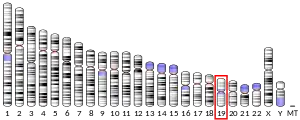Function
Human pregnancy-specific glycoproteins (PSGs) are a family of proteins that are synthesized in large quantities by the placental trophoblast and released into the maternal circulation during pregnancy. Molecular cloning and analysis of several PSG genes has shown that PSG forms a subset of the carcinoembryonic antigen (CEA) gene family that belongs to the immunoglobulin superfamily genes. Members of the CEA family consist of a single N domain that is structurally similar to the immunoglobulin variable domain, followed by a variable number of constant immunoglobulin-like A and / or B domains. Most PSGs have the Argglyasp (RGD) motif in the N-terminal domain. It has been shown to act as an adhesion recognition signal for some integrins.[1]
| PSG2 | |||||||||||||||||||||||||||||||||||||||||||||||||||
|---|---|---|---|---|---|---|---|---|---|---|---|---|---|---|---|---|---|---|---|---|---|---|---|---|---|---|---|---|---|---|---|---|---|---|---|---|---|---|---|---|---|---|---|---|---|---|---|---|---|---|---|
| Identifiers | |||||||||||||||||||||||||||||||||||||||||||||||||||
| Aliases | PSG2, CEA, PSBG2, PSG1, pregnancy specific beta-1-glycoprotein 2 | ||||||||||||||||||||||||||||||||||||||||||||||||||
| External IDs | OMIM: 176391 GeneCards: PSG2 | ||||||||||||||||||||||||||||||||||||||||||||||||||
| |||||||||||||||||||||||||||||||||||||||||||||||||||
| |||||||||||||||||||||||||||||||||||||||||||||||||||
| |||||||||||||||||||||||||||||||||||||||||||||||||||
| |||||||||||||||||||||||||||||||||||||||||||||||||||
| Wikidata | |||||||||||||||||||||||||||||||||||||||||||||||||||
| |||||||||||||||||||||||||||||||||||||||||||||||||||
Pregnancy-specific beta-1-glycoprotein 2 is a protein that in humans is encoded by the PSG2 gene.[4][5]
References
- ↑ Teglund, Stephan; Olsen, Anne; Khan, Wasif Noor; Frångsmyr, Lars; Hammarström, Sten (October 1994). "The Pregnancy-Specific Glycoprotein (PSG) Gene Cluster on Human Chromosome 19: Fine Structure of the 11 PSG Genes and Identification of 6 New Genes Forming a Third Subgroup within the Carcinoembryonic Antigen (CEA) Family". Genomics. 23 (3): 669–684. doi:10.1006/geno.1994.1556. PMID 7851896.
- 1 2 3 GRCh38: Ensembl release 89: ENSG00000242221 - Ensembl, May 2017
- ↑ "Human PubMed Reference:". National Center for Biotechnology Information, U.S. National Library of Medicine.
- ↑ Leslie KK, Watanabe S, Lei KJ, Chou DY, Plouzek CA, Deng HC, Torres J, Chou JY (Aug 1990). "Linkage of two human pregnancy-specific beta 1-glycoprotein genes: one is associated with hydatidiform mole". Proceedings of the National Academy of Sciences of the United States of America. 87 (15): 5822–6. Bibcode:1990PNAS...87.5822L. doi:10.1073/pnas.87.15.5822. PMC 54420. PMID 2377620.
- ↑ "Entrez Gene: PSG2 pregnancy specific beta-1-glycoprotein 2".
Further reading
- Thompson J, Koumari R, Wagner K, Barnert S, Schleussner C, Schrewe H, Zimmermann W, Müller G, Schempp W, Zaninetta D (Mar 1990). "The human pregnancy-specific glycoprotein genes are tightly linked on the long arm of chromosome 19 and are coordinately expressed" (PDF). Biochemical and Biophysical Research Communications. 167 (2): 848–59. doi:10.1016/0006-291X(90)92103-7. PMID 1690992.
- Zoubir F, Khan WN, Hammarström S (May 1990). "Carcinoembryonic antigen gene family members in submandibular salivary gland: demonstration of pregnancy-specific glycoproteins by cDNA cloning". Biochemical and Biophysical Research Communications. 169 (1): 203–16. doi:10.1016/0006-291X(90)91455-2. PMID 2350345.
- Streydio C, Lacka K, Swillens S, Vassart G (Jul 1988). "The human pregnancy-specific beta 1-glycoprotein (PS beta G) and the carcinoembryonic antigen (CEA)-related proteins are members of the same multigene family". Biochemical and Biophysical Research Communications. 154 (1): 130–7. doi:10.1016/0006-291X(88)90660-2. PMID 3260773.
- Trask B, Fertitta A, Christensen M, Youngblom J, Bergmann A, Copeland A, de Jong P, Mohrenweiser H, Olsen A, Carrano A (Jan 1993). "Fluorescence in situ hybridization mapping of human chromosome 19: cytogenetic band location of 540 cosmids and 70 genes or DNA markers". Genomics. 15 (1): 133–45. doi:10.1006/geno.1993.1021. PMID 8432525.
- Colland F, Jacq X, Trouplin V, Mougin C, Groizeleau C, Hamburger A, Meil A, Wojcik J, Legrain P, Gauthier JM (Jul 2004). "Functional proteomics mapping of a human signaling pathway". Genome Research. 14 (7): 1324–32. doi:10.1101/gr.2334104. PMC 442148. PMID 15231748.
- Mennuni C, Calvaruso F, Facciabene A, Aurisicchio L, Storto M, Scarselli E, Ciliberto G, La Monica N (Nov 2005). "Efficient induction of T-cell responses to carcinoembryonic antigen by a heterologous prime-boost regimen using DNA and adenovirus vectors carrying a codon usage optimized cDNA". International Journal of Cancer. 117 (3): 444–55. doi:10.1002/ijc.21188. PMID 15906358. S2CID 730919.

